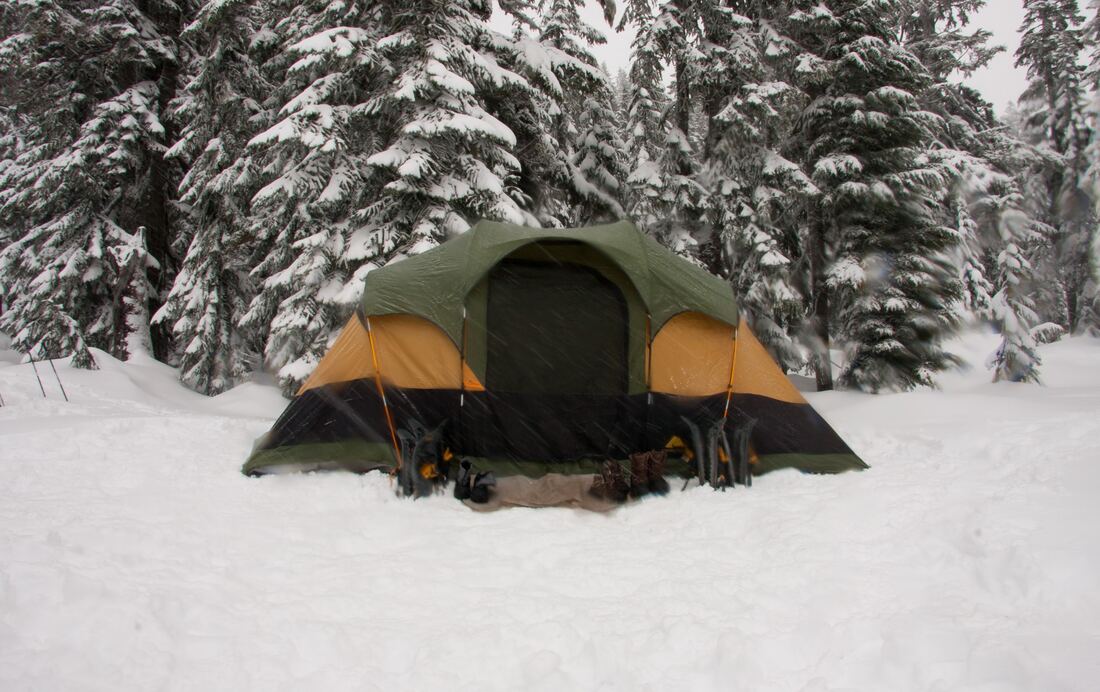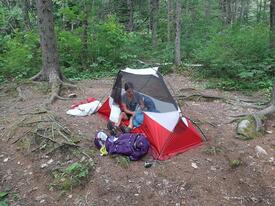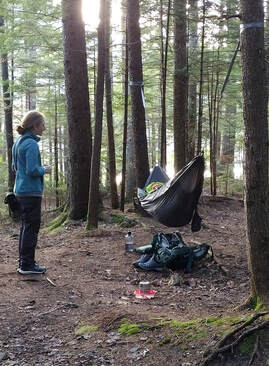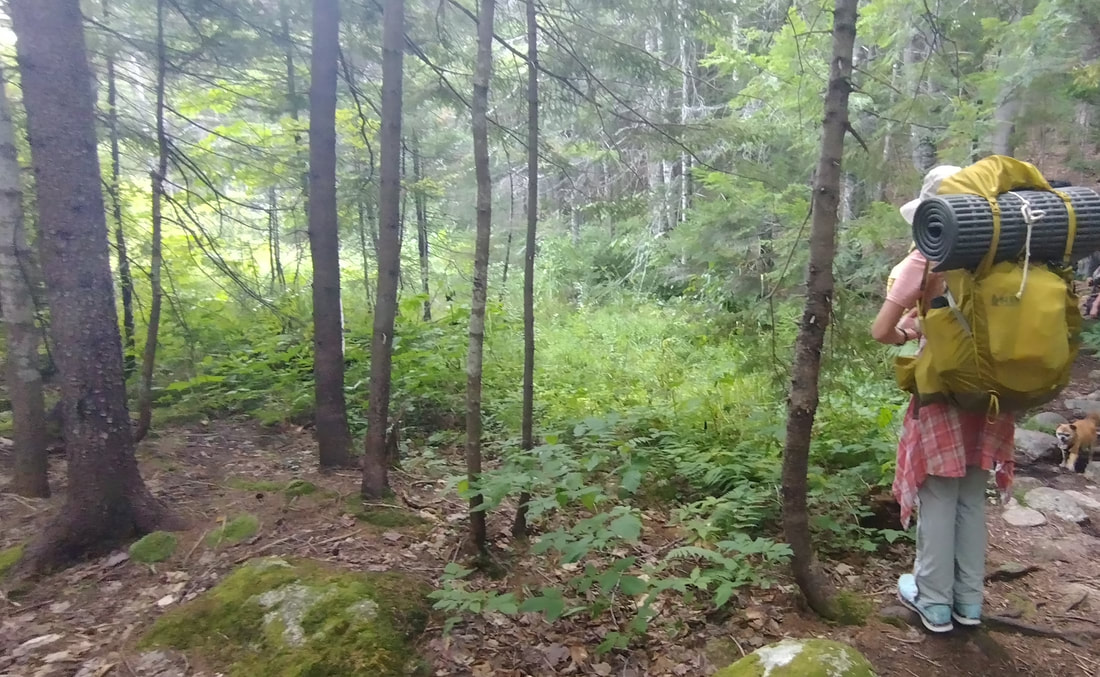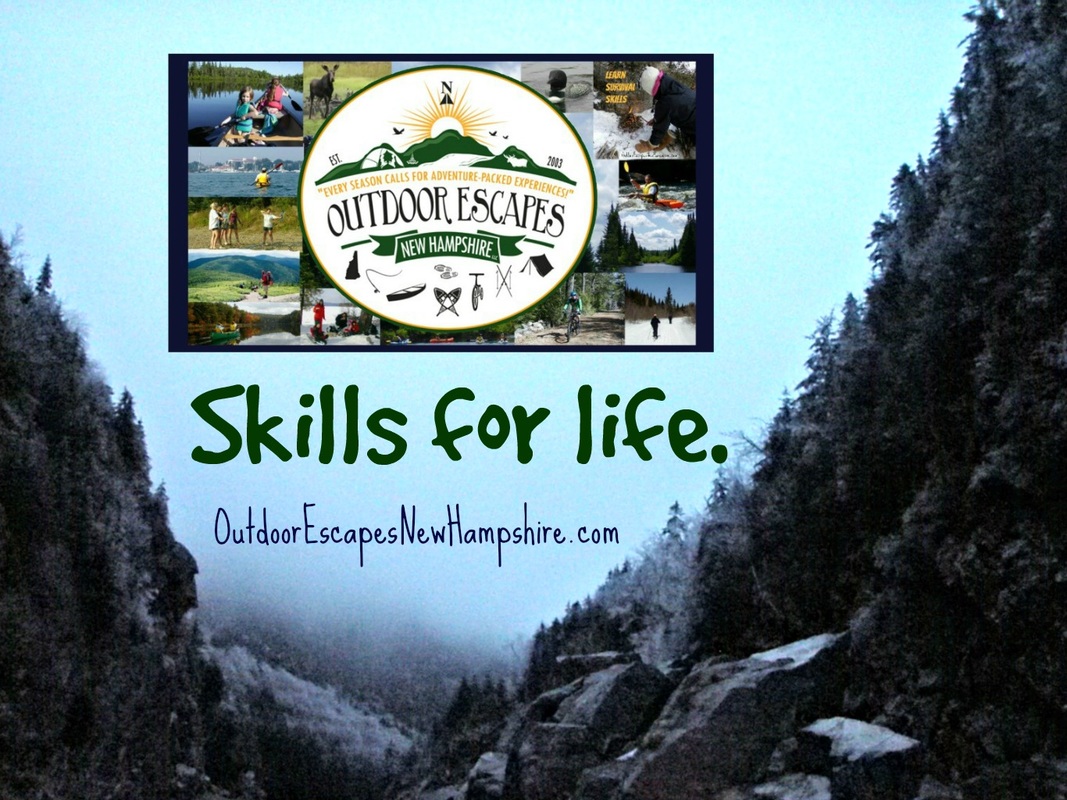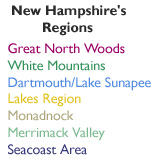3-Day Introduction to Backpacking & North Woods Survival Skills
|
Course Requirements: Good health and a positive attitude.
This course is designed to introduce beginner and experienced day hikers to the sport of backpacking. Our goal is to provide hikers with a solid foundation of basic trekking skills and knowledge necessary to hike and camp in forested mountain and valley areas of New Hampshire. We also offer River Canoe Camping 101 for those who want to be on the water. Do you want to learn how to prepare for a camping experience in the wilderness? Could you handle an emergency and survive in the outdoors? This jam-packed, hands-on learning experience, facilitated by our professional guides who want to help folks learn how to get into (and out of) nature safely, will add a life-long skill set for you to enjoy future excursions into the wild places of the Northern Forest which stretches around the northern hemisphere. With low-impact trekking and camping practices in mind, participants will learn how to plan, prepare, and implement an overnight hiking trip using the tools, skills, and knowledge to help you stay healthy and found. Backpacking skills can be used for a lifetime of living off the grid for periods of time to reach such goals as hiking long trails or just getting away for a weekend to see scenic vistas from mountain peaks and waterfalls along the way.
|
Tuition (open enrollment event)*
Adults (age 16 and up): $600 Min. 2 /max. 6 participants. Location Ossipee, NH (or other TBD) 2024 Dates Wed. Jan. 17 (10am) - Fri. Jan. 19 (2pm) Wed. Mar. 13 (10am) - Fri. Mar. 15 (2pm) Wed. May 8 (10am) - Fri. May 10 (2pm) Wed. June 5 (10am) - Fri. June 7 (2pm) Wed. July 10 (10am) - Fri. July 12 (2pm) Wed. Aug. 7 (10am) - Fri. Aug. 9 (2pm) Fri. Sept. 20 (10am) - Sun. Sept. 22 (2pm) Fri. Oct. 25 (10am) - Fri. Oct. 27 (2pm) * Private courses and adventures are also available by appointment year-round for individuals, groups of friends, and families with children. Please complete this form Contact guide/instructor Lucie Villeneuve at (603) 528-0136 (call/text) with any questions & concerns. Related
River Canoe Camping 101 |
Educational Activities
Depending on participant interest and time available, we try to fit in as many topics as we can, but be aware conditions might have us jumping into things for real. I.e. Rain gear is on the pack list, so we may as well use it to keep dry and warm, right? Either way, it will be an educational journey.
- Learn about the 10 essentials of survival, as well as weather, environmental hazards, common injuries, illnesses--incl. how to recognize & treat hypothermia.
- Learn how to put together a survival kit to take with you on future outdoor adventures.
- Discover the best way to pack your backpack and make adjustments for best fit and comfort.
- Learn how to read a topographic map and use a map and compass together for route planning without battery operated devices.
- Learn about knife safety and practical use with natural resources, finding and purifying water, and setting up a tent/primitive shelter.
- Practice useful knots and building a proper fire for emergencies.
- Learn how to use a camp stove and cook hearty meals.
- Explore Northern Forest ecology as well as various leadership and followship roles within the hiking group.
- Hear survival tips along the way from our seasoned guides sharing their wisdom.
Gear/Equipment Needed
Please note that sleeping bags and pads, backpacks, and tents are available to rent or buy online or local stores ahead of time. Guides provide all meals and cooking gear.
- Waterproof hiking boots, insulated in winter weather.
- Camp shoes/sturdy sandals (no flip-flops).
- Snowshoes and/or snow spikes in winter (November through June in some places).
- Large backpack, lined with plastic bags to keep gear dry.
- Sleeping bag (rated for the season) and insulated sleeping pad required for overnighting in either natural shelter or tents.
- Tent with full rainfly (rated for the season), or bivy sack, hammock, and/or tarp.
- Wear/bring seasonal layers of clothing (no cotton), including thermal underwear, polar fleece or wool insulating layer, and weatherproof outer layer such as expedition-style rain jacket and pants (June - Sept.), or snow parka and snow pants (Sept. - June), as well as winter hat, mittens, and extra socks.
- Sunscreen, sunglasses with strap, hat with visor, insect repellent, and/or protective clothing (optional/seasonal).
- (2) Reusable wide-mouthed 1-liter water bottles (filled).
- Insulated mug with cover (or metal cup with handle), bowl with cover (plastic or metal), spoon/fork.
- Favorite energy snacks.
- Swim suit and towel (June - Sept.).
- Personal toiletry items and medications.
- Spare street clothes and shoes, small towel, and extra water to keep in your vehicle for afterwards.
Depending on participant interest and time available, we try to fit in as many topics as we can, but be aware conditions might have us jumping into things for real. I.e. Rain gear is on the pack list, so we may as well use it to keep dry and warm, right? Either way, it will be an educational journey.
- Learn about the 10 essentials of survival, as well as weather, environmental hazards, common injuries, illnesses--incl. how to recognize & treat hypothermia.
- Learn how to put together a survival kit to take with you on future outdoor adventures.
- Discover the best way to pack your backpack and make adjustments for best fit and comfort.
- Learn how to read a topographic map and use a map and compass together for route planning without battery operated devices.
- Learn about knife safety and practical use with natural resources, finding and purifying water, and setting up a tent/primitive shelter.
- Practice useful knots and building a proper fire for emergencies.
- Learn how to use a camp stove and cook hearty meals.
- Explore Northern Forest ecology as well as various leadership and followship roles within the hiking group.
- Hear survival tips along the way from our seasoned guides sharing their wisdom.
Gear/Equipment Needed
Please note that sleeping bags and pads, backpacks, and tents are available to rent or buy online or local stores ahead of time. Guides provide all meals and cooking gear.
- Waterproof hiking boots, insulated in winter weather.
- Camp shoes/sturdy sandals (no flip-flops).
- Snowshoes and/or snow spikes in winter (November through June in some places).
- Large backpack, lined with plastic bags to keep gear dry.
- Sleeping bag (rated for the season) and insulated sleeping pad required for overnighting in either natural shelter or tents.
- Tent with full rainfly (rated for the season), or bivy sack, hammock, and/or tarp.
- Wear/bring seasonal layers of clothing (no cotton), including thermal underwear, polar fleece or wool insulating layer, and weatherproof outer layer such as expedition-style rain jacket and pants (June - Sept.), or snow parka and snow pants (Sept. - June), as well as winter hat, mittens, and extra socks.
- Sunscreen, sunglasses with strap, hat with visor, insect repellent, and/or protective clothing (optional/seasonal).
- (2) Reusable wide-mouthed 1-liter water bottles (filled).
- Insulated mug with cover (or metal cup with handle), bowl with cover (plastic or metal), spoon/fork.
- Favorite energy snacks.
- Swim suit and towel (June - Sept.).
- Personal toiletry items and medications.
- Spare street clothes and shoes, small towel, and extra water to keep in your vehicle for afterwards.
